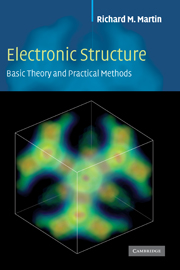Book contents
- Frontmatter
- Contents
- Preface
- Acknowledgments
- Notation
- Part I Overview and background topics
- Part II Density functional theory
- Part III Important preliminaries on atoms
- Part IV Determination of electronic structure: the three basic methods
- Part V Predicting properties of matter from electronic structure – recent developments
- Appendix A Functional equations
- Appendix B LSDA and GGA functionals
- Appendix C Adiabatic approximation
- Appendix D Response functions and Green's functions
- Appendix E Dielectric functions and optical properties
- Appendix F Coulomb interactions in extended systems
- Appendix G Stress from electronic structure
- Appendix H Energy and stress densities
- Appendix I Alternative force expressions
- Appendix J Scattering and phase shifts
- Appendix K Useful relations and formulas
- Appendix L Numerical methods
- Appendix M Iterative methods in electronic structure
- Appendix N Code for empirical pseudopotential and tight-binding
- Appendix O Units and conversion factors
- References
- Index
Appendix F - Coulomb interactions in extended systems
Published online by Cambridge University Press: 05 June 2012
- Frontmatter
- Contents
- Preface
- Acknowledgments
- Notation
- Part I Overview and background topics
- Part II Density functional theory
- Part III Important preliminaries on atoms
- Part IV Determination of electronic structure: the three basic methods
- Part V Predicting properties of matter from electronic structure – recent developments
- Appendix A Functional equations
- Appendix B LSDA and GGA functionals
- Appendix C Adiabatic approximation
- Appendix D Response functions and Green's functions
- Appendix E Dielectric functions and optical properties
- Appendix F Coulomb interactions in extended systems
- Appendix G Stress from electronic structure
- Appendix H Energy and stress densities
- Appendix I Alternative force expressions
- Appendix J Scattering and phase shifts
- Appendix K Useful relations and formulas
- Appendix L Numerical methods
- Appendix M Iterative methods in electronic structure
- Appendix N Code for empirical pseudopotential and tight-binding
- Appendix O Units and conversion factors
- References
- Index
Summary
Summary
The subject of this appendix is formulations and explicit equations for the total energy that properly take into account the long-range effects of Coulomb interactions. We emphasize the Kohn–Sham independent-particle equations and expressions for total energy; however, the ideas and many of the equations also apply to many-body calculations. There are three main issues:
Identifying various convenient expressions that each yield properly the intrinsic total energy per formula unit for an extended bulk system.
Understanding and calculating the effect upon the average potential in a bulk material due to dipole terms at surfaces and interfaces.
Treating finite systems, where there is no essential difficulty, but where it is convenient to carry out the calculations in a periodic “supercell” geometry.
Basic issues
There is a simple set of guiding principles that must be followed to properly treat long-range Coulomb interactions in extended systems. If the calculations are carried out in a cell that represents an infinite system, i.e. the unit cell of a crystal, or a “supercell” constructed so that its limiting behavior represents a macroscopic system, then:
The cell must be chosen to be neutral;
The neutral cell can be used to define a proper thermodynamic “reference state” if in addition we require that there is no average (macroscopic) electric field;
[…]
- Type
- Chapter
- Information
- Electronic StructureBasic Theory and Practical Methods, pp. 499 - 511Publisher: Cambridge University PressPrint publication year: 2004



